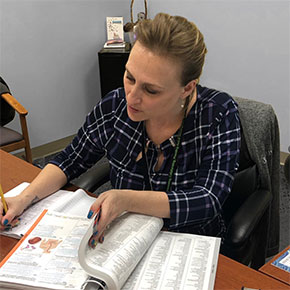
Written and reported by:
Lisa Jaffe
Contributing writer
The new year gives us all a chance to check in with ourselves and make resolutions to help us become the best versions of ourselves. It’s a perfect time to look at your career goals and consider some resolutions that put you on the path to advancement.
We asked some allied health professionals how they reached their career goals. All of their paths were a bit different, but they had similar suggestions to help others succeed.
1. Do Your Research
Whether you’re just beginning your allied health education or looking to advance your career through education, you’ll want to make sure the program you choose sets you up for success and that you understand licensing and certification requirements.
Will a Program Give You the Education You Want?

Cordialis Msora-Kasago, MA, RDN, is a dietitian nutritionist with 21 years of professional experience. She knew she wanted to do something in the area of food and health from a young age when she met a family friend who was a dietitian. And when it came time to choose a degree program, she knew she wanted to find a program that included internships.
“I wanted to have an education that would give me an idea of the places where I could work, rather than having to go looking after graduation,” she says, noting that trying out different dietitian roles is something many don’t have a chance to do without an advanced degree or skipping from job to job.
Her program at California State University in Los Angeles arranged internships at several locations, including a month at a Special Supplemental Nutrition Program for Women, Infants, and Children (WIC) clinic, a stint in a school nutrition department, and time in hospitals.
Today, Msora-Kasago is a clinical nutrition consultant in the Los Angeles area, working with hospitals to create nutrition programs for people of African descent based on cultural issues surrounding food, health, and eating.
Does a Program Provide the Flexibility You Need?
Some professionals want to go back to school—perhaps to pursue a graduate degree or a certificate—but they worry about how they’ll manage school and work. An online or hybrid program could give you the flexibility you need to pursue more education while you work.

Aimee Shapiro, MSW, LCSW, started out as a government lawyer but went back to school later in life to become a massage therapist and then a social worker. Today, she has a therapy practice in the Los Angeles area. For her, the key to returning to school was finding a college near both home and work. She had to get a bachelor’s degree in her new field, and then a master’s degree to pursue her career goals.
Others may want to consider online programs, hybrid programs that require training and clinical work in person, or simply any program that offers classes that work around their existing schedule.
Does a Program Meet Licensing Requirements?

Gina Piccirilli, CPC, CPB, CPMA, trains physicians in billing and coding practices. She also came to her allied health career later in life. She ended up working part time in billing and coding for three years while keeping her day job before finding something that paid enough to provide for her family.
Piccirilli, who practices in New York, says the real key to her success was making sure her program met the licensing and credentialing requirements to launch her career. “My teacher taught us specifically to pass the test as it was at the time,” she says. A good program will ensure that its courses keep pace with the industry and any changes in required examinations. Piccirilli said she found an evening program that worked with her schedule.
What Are State Requirements for Your Profession?

Noah Starer, MSW, LICSW, says you should also investigate state requirements for your profession before you graduate. In Washington state, where he works, he needed a state license, plus a certain number of supervised hours. Many states require a licensure test and continuing education hours to maintain a license.
Starer, who is a therapist in Seattle, says that Washington also required professional certification to bill insurance for his services. This was crucial for his success because without insurance reimbursement, potential clients might not have been able to afford therapy and that could have stunted his practice.
2. Think Outside the Box When It Comes to Your Career Track
Your career track and the setting in which you work can play a crucial role in whether you thrive at work. You’ll want to think about this when choosing a program, as you gain experience in your program, and when you begin your job search. If you’re a current professional and love your field but not your work, think about a course correction.
Msora-Kasago knew she could pursue work in a variety of settings because of the different internships she had. But a lot of allied health professionals may not consider—or even know about—all the places they can work.
For instance, in addition to healthcare settings, nutritionists can work for large restaurant conglomerates, at universities, or even for airlines.
Most people immediately think of healthcare settings like hospitals for allied healthcare careers. These can be intense workplaces, says Msora-Kasago, who suggests that it might be wise to look outside of them if you tend to take the sadness and stress of your work home. “It can be hard to experience death in the workplace,” she says.
Embracing Different Experiences Can Help You Choose a Track
Starer has worked in a variety of settings, some more stressful than others. His last stint before starting his own therapy practice was in the emergency department at Swedish Hospital in Seattle, where he says he worked with people at their lowest point. Starer views it as a privilege to be present at those times, to be trusted enough to help people make breakthroughs.
He notes that many allied healthcare workers, no matter their field, work with patients in crisis. Like Msora-Kasago, he encourages new professionals to consider how much trauma you can take on in your work.
Starer has also worked in corporate settings, such as insurance companies, that have little face-to-face interaction with patients. Pay tends to be higher in the corporate world, and many allied health professionals can find work with consulting firms, accounting firms, law firms, and even companies that need help developing psychological testing or focus group protocols.
“I wanted exposure to a lot of different jobs and different settings,” Starer says. “My education gave me training in social work, community organizing, and working as a probation officer. I wanted those different experiences.”
Understand the Roles You Pursue
Shapiro says research into potential workplaces is just as important as choosing a school. “I have had experiences where I took a job because I felt I had to, and didn’t really investigate what the work was like,” she says.
This was the case when she worked with adolescent girls in a residential care unit, a position Shapiro said was emotional and intense. “It would have been better to know ahead of time, so I could prepare myself,” she says.
3. Tap the Experience and Knowledge of Others
Whether you’re launching a job search, working to advance in your field, or considering a new career, talking to professionals already where you want to be can provide valuable insight.
Msora-Kasago suggests interviewing or shadowing someone doing a job you’re interested in. If you’re considering earning a certification to advance your skills and knowledge, she says you should talk to professionals in the various roles the credential will prepare you for.
“Volunteer at a hospital. Find out what it looks like to work in this role in this place,” she says. Even if the person you’re shadowing was in school years ago, they can still offer advice about what they wish they had learned or done while in school, or options they didn’t pursue.
Once you are in a job, Msora-Kasago suggests you find a mentor to talk through issues or strategies to advance. “I wanted to be a leader,” she says. “I needed to ask: What skills do I need, what am I weak on?”
Later in your career, you can become a mentor yourself, which can often teach you as much as you teach the person you’re mentoring. “They come in with new information from their more recent education, and with new best practices. We both benefit,” says Msora-Kasago.
4. Raise Your Hand Often
When you’re starting out in a career, it’s a good idea to volunteer for new initiatives and committee work and to attend meetings and conferences. These opportunities can expand your skills and knowledge and help you network. This will prime you for advancement or the next big opportunity.
“No one will tap you on the shoulder,” says Msora-Kasago. “Find out what you want and then go after it. Maybe you start with a lateral move, not an increase in responsibility or pay or rank. But in any new position, you will learn something new.”
5. Earn a Certification to Boost Your Profile
If you’re looking to advance or eyeing a lateral move into something a bit different, certifications can help you get there. Professional certifications can demonstrate deep knowledge, expertise, and commitment to your field. Higher-ups and stakeholders, in turn, may place more confidence in you.
Piccirilli says that in billing and coding, having credentials in practice management and medical auditing have helped her understand the entire spectrum of the billing cycle, which helps her better serve her clients.
“Go for something that will improve you professionally,” she says. “While everything can improve you personally, at the end of the day, you want to pay your bills. So do something that can help you do that.”
You may also enjoy:




